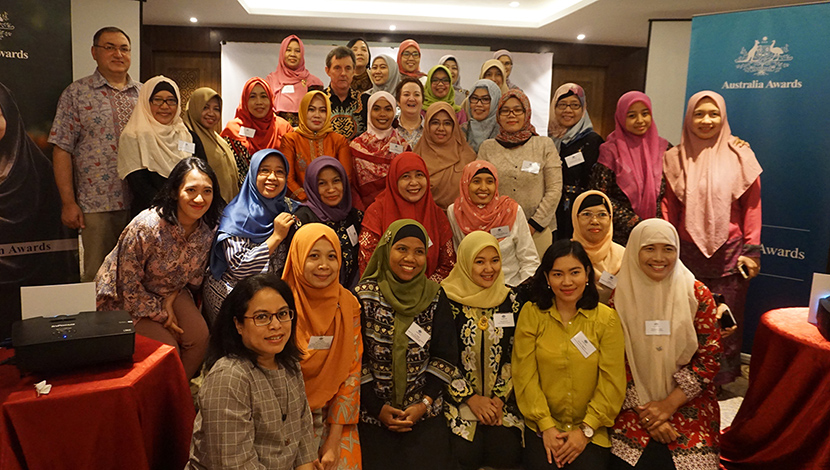An ADI course is helping Indonesian Islamic women leaders build capacity.
A new course developed at Deakin University is set to empower 30 Indonesian women leaders with enhanced leadership roles within their communities.
The Leadership Development Course for Islamic Women Leaders is being developed and led by Alfred Deakin Institute’s Senior Research Fellow, Dr Rebecca Barlow, in partnership with Australia Awards in Indonesia and the Australian Department of Foreign Affairs and Trade.
It has been funded by a prestigious Australia Awards Scholarships “Short Term Award” from the Australian Government. Participants have been selected from universities, religious institutions, and women’s and other civil society organisations.
ADI Deputy Director of International Partnerships and course advisor, Professor Shahram Akbarzadeh, said the course will explore critical issues in women’s leadership, including how transformative feminist leadership offers an alternative to traditional, masculine-oriented leadership styles.
“Ultimately, it will equip the women with the knowledge and skills to help increase women’s participation in the workforce in Indonesia and in the public sphere in general, in their communities, philanthropy and entrepreneurialism,” he said.
[testimonial_text]In the workforce it will help them address structural, cultural and internal barriers to women’s participation, such as power relations, especially in male-dominated fields.[/testimonial_text]
[testimonial_picture name=”Dr Rebecca Barlow” details=”ADI Senior Research Fellow”]
 [/testimonial_picture]
[/testimonial_picture]Project leader, Dr Barlow, who is an expert in women’s leadership, said the course will entail a ten-day visit to Melbourne and two three-day sessions in Indonesia. The Melbourne phase will include site visits to leading multicultural and women’s organisations, high-level meetings, expert panels and networking sessions.
“Awardees will also meet with influential Australian women leaders from a range of fields, including health, the media, business and the not-for-profit sector, as well as local, state and federal politics,” she said.
“They will be exposed to the range of women’s organisations in Australia, as well as the policies and procedures that we have here, but the learning will very much be two-way. The course is geared towards relationship building. Indonesia is one of Australia’s largest strategic partners.
“As a result of the course, the women will have the ability to fine-tune their leadership skills and adapt the strategies they have developed during the course to the local context in Indonesia.
“They will acquire the capacity to be key players in improving economic, social, and cultural development in their own organisations, as well as in the wider community. They will also be in a position to build global networks for future women leaders. We hope that it will have a multiplying effect, particularly through the leadership action plans they develop as part of the program, which they will implement in their workplace or community when they return.
“ADI is thrilled to have the opportunity to implement this exciting project on behalf of Australia Awards in Indonesia and looks forward to welcoming the delegation of Indonesian Islamic women leaders to Melbourne in September.
Published by Deakin Research on 18 August 2017.




